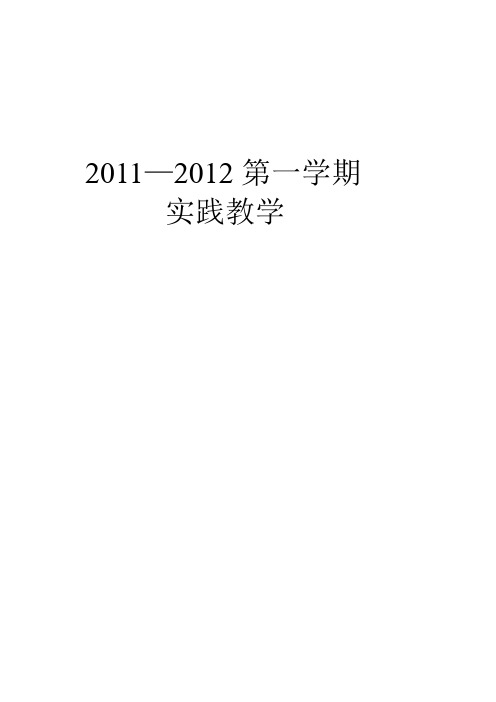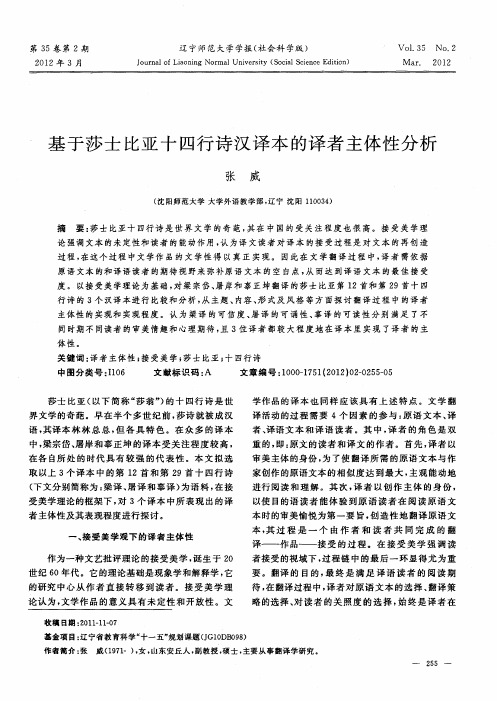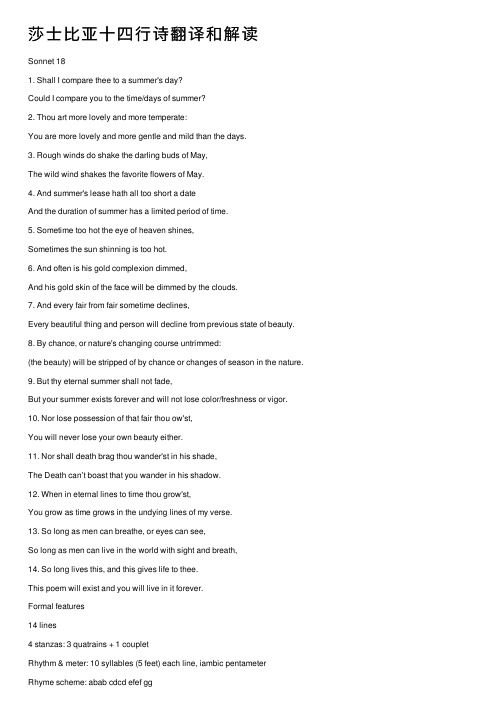评辜正坤译莎士比亚十四行诗第129首
William Shakespeare莎士比亚代表诗歌翻译及赏析

2011—2012第一学期实践教学William ShakespeareWilliam Shakespeare (26 April 1564- 23 April 1616) was an English poet and playwright. He was widely regarded as the greatest writer in the English language and the world's pre-eminent dramatist. His surviving works, including some collaboration, consist of about 38 plays, 154 sonnets, two long narrative poems, and several other poems. His plays have been translated into every major living language and are performed more often than those of any other playwright.Shakespeare was born and raised in Stratford-upon-Avon. At the age of 18, he married Anne Hathaway, with whom he had three children: Susanna, and twins Hamnet and Judith. Between 1585 and 1592, he began a successful career in London as an actor, writer, and part owner of a playing company called the Lord Chamberlain's Men, later known as the King's Men.Shakespeare produced most of his known work between 1589 and 1613. His early plays were mainly comedies and histories, genres he raised to the peak of sophistication and artistry by the end of the 16th century. He then wrote mainly tragedies until about 1608, including Hamlet, King Lear, Othello, and Macbeth, considered some of the famous works.Shakespeare was a respected poet and playwright in his own day, but his reputation did not rise to its present heights until the 19th century. In the 20th century, his work was repeatedly adopted and rediscovered by new movements in scholarship and performance. His plays remain highly popular today and are constantly studied, performed and reinterpreted in diverse cultural and political contexts throughout the world.(Sonnet1 和sonnet5的相关资料由张文瑞提供)Sonnet 1That thereby beauty's rose might never die,But as the riper should by time decease,His tender heir might bear his memory;But thou, contracted to thine own bright eyes,Making a famine where abundance lies,Thyself that art now the world's fresh ornamentAnd only herald to the gaudy springWithin thine own bud buriest thy content,And, tender churl, mak'st waste in niggarding.To eat the world's due, by the grave and thee.(辜正坤《莎士比亚十四行诗》2008年1月第一版)译文:我们总愿美的物种繁衍昌盛,好让美的玫瑰永远也不凋零。
基于莎士比亚十四行诗汉译本的译者主体性分析

21 0 2年 3 月
辽 宁师 范大学 学报 ( 社会 科 学版 )
J u n l fL a nn r l iest ( o ilS in eE i o ) o r a io ig No ma v r i S ca ce c d t n o Un y i
-— —
2 5 -— 5 —
张 威 : 于 莎士 比亚十 四行诗 汉译本 的译者主体 性分析 基 替 未来 的读 者 进 行 择 断 。因 此 , 翻译 过 程 中, 在 译 者 在充 分扮演 原 文 的读 者 和译 文 的作 者 的基 础 上 ,
消玉殒 ” “ 黑 的卷 发 渐 渐 披 上 银 霜 ” “ 间 的镰 、黝 ,时 刀” 等隐 喻 的手 段 向他 的 读 者传 达 他 的 感 悟 : 命 生
主体 性 的实现和 实现 程度 。 认 为梁 译 的可 信度 、 译 的 可诵 性 、 屠 辜译 的可读 性分 别 满足 了不 同时期不 同读 者 的审美 情趣 和心理 期待 , 3位译 者 都 较 大程 度地 在 译 本 里实 现 了译 者 的 主 且
体 性。
关键词 : 者 主体 性 ; 受美 学 ; 士 比亚 ; 四行诗 译 接 莎 十 中图分 类号 :1 6 I0 文献标 识 码 : A 文章编 号 :0 0 1 5 (0 2 0 -2 50 1 0 - 7 1 2 1 )20 5 -5 学作 品的译 本 也 同 样 应 该 具 有 上 述 特 点 。文 学 翻
者 主 体性及 其表 现程度 进行 探 讨 。
一
、
接受 美学 观下 的译者 主体 性
译—— 作 品—— 接 受 的 过 程 。 在 接 受 美 学 强 调 读
者接受 的视 域 下 , 程 链 中 的最 后 一 环 显 得 尤为 重 过
莎士比亚十四行诗原文译文探析

莎士比亚十四行诗原文译文探析莎士比亚(William Shakespeare)作为英国文学史上最重要的艺术家之一,其作品一直被世人推崇。
他的十四行诗(sonnet)尤为著名,这些诗歌探讨了爱情、时间、美丽和死亡等永恒的主题。
本文将深入探讨莎士比亚十四行诗的原文及其中文译文,并分析其中蕴含的深刻意义。
首先我们来看莎士比亚的第一首十四行诗,即《莎士比亚十四行诗之一》。
我们首先注意到的是这首诗歌采用了抑扬格的形式,每行由十个音节组成。
莎士比亚通过这种形式的诗歌,表达了对美丽的渴望和对时间流逝的思考。
诗中他说“我们渴望美好的事物能够繁衍,这样美丽之花永不凋谢。
但是随着时光流逝,其越成熟的身影消逝,而他的后代要承载其记忆。
但是你呀,被局限在自己明亮的双眼里,用自我实质的燃料来滋养你的光芒,使得丰富之处变成了匮乏,你是你自己的敌人,对自己太残忍。
”莎士比亚通过这首诗表达了对美丽的追求,以及对个体自我局限的思考。
对于这首诗歌的中文译文,我们可以感受到译者对文章语言美感的运用,使得诗歌在翻译过程中没有失去原有的意境和氛围。
我们可以注意到这首诗歌的表现手法同样采用了抑扬格的形式,每行也由十个音节组成。
诗中莎士比亚表达了对爱人美好容颜的赞美以及对其永恒之美的祝福。
他说:“我要拿你和夏日作比较吗?你比夏天更可爱更温和:狂风能把五月里娇嫩的花蕾摇得摇摆;夏季风光太短促了。
时而天国之眼的光线太过灼热,经常神色黯淡;任何美景都有它的凋残时刻,无论是偶然或是自然因素的干扰。
但是你的永恒夏日永不凋谢,不会失去那属于你的美;死亡也不能夸耀你在他的阴影下徘徊;当你在永恒的诗行里,与时间一同成长,只要人类能喘息,眼睛还能看,你就会永世长存,这首诗也会永存,并为你赋予生命。
”这首诗歌充满了对爱人的赞美和祝福,表达了作者的深情厚爱。
对于这样一首表达深情的诗歌,在翻译的过程中,译者的语言功底和艺术修养显得尤为重要。
他们需要将原文中的美感和情感完整地传递给读者,使读者在欣赏翻译诗歌时能够感受到原诗所传达的深厚意蕴。
莎士比亚十四行诗翻译和解读

莎⼠⽐亚⼗四⾏诗翻译和解读Sonnet 181. Shall I compare thee to a summer's day?Could I compare you to the time/days of summer?2. Thou art more lovely and more temperate:You are more lovely and more gentle and mild than the days.3. Rough winds do shake the darling buds of May,The wild wind shakes the favorite flowers of May.4. And summer's lease hath all too short a dateAnd the duration of summer has a limited period of time.5. Sometime too hot the eye of heaven shines,Sometimes the sun shinning is too hot.6. And often is his gold complexion dimmed,And his gold skin of the face will be dimmed by the clouds.7. And every fair from fair sometime declines,Every beautiful thing and person will decline from previous state of beauty.8. By chance, or nature's changing course untrimmed:(the beauty) will be stripped of by chance or changes of season in the nature.9. But thy eternal summer shall not fade,But your summer exists forever and will not lose color/freshness or vigor. 10. Nor lose possession of that fair thou ow'st,You will never lose your own beauty either.11. Nor shall death brag thou wander'st in his shade,The Death can’t boast that you wander in his shadow.12. When in eternal lines to time thou grow'st,You grow as time grows in the undying lines of my verse.13. So long as men can breathe, or eyes can see,So long as men can live in the world with sight and breath,14. So long lives this, and this gives life to thee.This poem will exist and you will live in it forever.Formal features14 lines4 stanzas: 3 quatrains + 1 coupletRhythm & meter: 10 syllables (5 feet) each line, iambic pentameterRhyme scheme: abab cdcd efef ggStructure:1st – 2nd quatrains: an introduction to and development of a problem3rd quatrain: a volta or a turn “突转”(a change in direction, thought, or emotion)the couplet: a summary or conclusionThe theme:The main theme is t he power of the speaker’s poem to defy time and last forever, carrying the beauty of the beloved down to future generations.What is it about?The speaker opens the poem with a question addressed to the beloved: “Shall I compare thee toa summer’s day?” The next eleven lines are devoted to such a comparison. Summer: (Line 3: rough winds;4:too short;5. too hot;6. too dimmed;7&8. beautiful things will die) Sonnet 18 is the first poem in the sonnets not to explicitly encourage the young man to have children. The “procreation” sequence of the first 17 sonnets ended with the speaker’s realization that the young man might not need children to preserve his beauty; he could also live forever in this poem.Figures of speechIn line (5 ) There is a Metaphor .In line ( 5+6 ) There is a Personification .( eye of Heaven shines ) : Eye of heaven = the sunThe sun became dark because dark of clouds .In Line (9+10+12 ) There is a Hyperbole .In Line ( 11 )There is a personification .In Line ( 14 ) There is an Inverted order .Analysis: (拓展)The poem works at a rather curious level of achieving its objective through dispraise.The summer's day is found to be lacking in so many respects (too short, too hot, too rough, and sometimes too dingy), but curiously enough one is left with the abiding impression that 'the lovely boy' is in fact like a summer's day at its best, fair, warm, sunny, temperate, one of the darling buds of May, and that all his beauty has been wonderfully highlighted by the comparison.Sonnet 1301. My mistress' eyes are nothing like the sun;My lady’s eyes aren’t like the sun at all.2. Coral is far more red, than her lips red:Coral is much redder than her lips.3. If snow be white, why then her breasts are dun;If snow is white, then her breasts are brown.4. If hairs be wires, black wires grow on her head.If hair is as coarse as threads, then her hair is full of black threads.5. I have seen roses damasked, red and white,I have seen the pinkish, red and white roses.6. But no such roses see I in her cheeks;But I can see such kinds of roses in her cheeks.7. And in some perfumes is there more delightThere is much tempting/attractive fragrance.8. Than in the breath that from my mistress reeks.The fragrance is more attractive than her steamy, sweaty and unsavory smells.9. I love to hear her speak, yet well I knowI like listening to her speaking, but I am also aware that10. That music hath a far more pleasing sound:The sound of music is much more favorable than her sound.11. I grant I never saw a goddess go,I admit that I never saw a goddess walking by.12. My mistress, when she walks, treads on the ground:My mistress stamps on the floor when she walks.13. And yet by heaven, I think my love as rare,But I can swear to God that my lover is as precious as15. As any she belied with false compare.As any woman who has been misrepresented by ridiculous comparisons.Formal features14 lines4 stanzas: 3 quatrains + 1 coupletRhythm & meter: 10 syllables (5 feet) each line, iambic pentameterRhyme scheme: abab cdcd efef ggStructure:1st – 2nd quatrains: an introduction to and development of a problem3rd quatrain: a volta or a turn “突转”(a change in direction, thought, or emotion)the couplet: a summary or conclusionThemeThe poet suggests their love is rare because he does not desire her to be something she is not.It's about finding love in spite of (or maybe even because of) physical flaws.It pokes fun at our obsession with looks and to show how ridiculous it is to ask any person to live up to some ideal of perfect beauty.Figures of speechNegative similesSimile may also be expressed in the negative form“My mistress’ eyes are nothing like the sun”Etc.Ironic toneThe sonnet appears to be humorous, but the couplet displays the deeply romantic tone of the poem.Analysis(拓展)In many ways, Shakespeare’s sonnets subvert and reverse the conventions of the Petrarchan love sequence: the idealizing love poems, for instance, are written not to a perfect woman but to an admittedly imperfect man, and the love poems to the dark lady are anything but idealizing, like this one. He describes the woman that he loves in extremely unflattering terms but claims that he truly loves her, which lends credibility to his claim because even though he does not find her attractive, he still declares his love for her.Sonnet 1291. The expense of spirit in a waste of shameThe expenditure of sexual energy in a desert of shameful moral decay2. Is lust in action: and till action, lustIs the lust/letch acting: and before having sexual intercourse, lust3. Is perjured, murderous, bloody, full of blame,Is dishonest, murderous, violent and blameworthy with a lot of guilt.4. Savage, extreme, rude, cruel, not to trust;Barbaric, extreme, rude, cruel, and untrustworthy.5. Enjoyed no sooner but despised straight;As soon as lust has been enjoyed, it is hated.6. Past reason hunted; and no sooner had,Lust is pursued beyond the control of reason, as soon as lust is fulfilled,7. Past reason hated, as a swallowed bait,It is hated irrationally like a bait that a fish swallows8. On purpose laid to make the taker mad.(The bait) set on purpose to make the trapped creature react with frenzy.9. Mad in pursuit and in possession so;10. Had, having, and in quest to have extreme;The taker is insane in pursuing one's lust and mad in possessing the object of lust: going to extremes in having had it, in the having of it, and in seeking to have it;11. A bliss in proof, and proved, a very woe;A heavenly sensation while it is being experienced. Once you are done, it is a true sorrow.12. Before, a joy proposed; behind a dream.An expected joy exists before having it; after having it, it seems like a dream.13. All this the world well knows; yet none knows wellEveryone in the world knows it very well, but no one knows14. To shun the heaven that leads men to this hell.To avoid the tempting sense of delight which leads men to hell.Formal features14 lines4 stanzas: 3 quatrains + 1 coupletRhythm & meter: 10 syllables (5 feet) each line, iambic pentameterRhyme scheme: abab cdcd efef ggStructure:1st – 2nd quatrains: an introduction to and development of a problem3rd quatrain: a volta or a turn “突转”(a change in direction, thought, or emotion)the couplet: a summary or conclusionThemeAbout lust.–Lines 1-2: lust in action (shameful and wasteful...)–Lines 3-4: lust before action (dishonest, murderous, bloody…)–Lines 5-8: a comparison between lust before and after action (enjoyed vs.despised; both are past-reason / mad) – lust causes madness!–Lines 9-12: a comparison between lust before and after action. (bliss vs. woe;joy vs. dream) – lust causes sadness and disillusionment.–Lines 13-14: a conclusion.Figures of speechSimile: taker of lust as a hooked fishPersonification: lust as a personContrasts: "before" vs. "behind" (after), "heaven" vs. "hell," and so on.Analysis (拓展)The profound hatred of sexuality, sexual pessimismIts hatred of sexuality derives from the Christian imperative of the virginal life and the dislike of all bodily functionsIt gives essentially a phallo-centric view of sexImpersonal tone: The speaker never says outright that he is writing about his own experience; instead, he presents the poem as an impersonal description, a catalogue of the kinds of experience offered by lust.。
莎士比亚十四行诗翻译的比较

大连外国语学院Dalian University of Foreign languages 莎士比亚十四行诗翻译的比较课程名称翻译简史院系研究生部年级专业 2011级英语笔译姓名林玲学号 **********时间 2011-12-30莎士比亚十四行诗翻译的比较摘要:莎士比亚十四行诗在英国文学史上,乃至世界文学史上都具有崇高的地位。
解放后,中国很多翻译大家都或多或少的翻译了莎士比亚十四行诗,本文旨在总结解放后出现于市面的翻译版本,并对梁宗岱、屠岸、戴镏龄、辜正坤翻译的十四行诗第十八首,从音节,韵脚,标点以及内容四方面进行对比分析。
十四行诗最初流行于意大利,彼特拉克的创作使其臻于完美,又称“彼特拉克体”,后传到欧洲各国。
莎士比亚十四行诗大约创作于1590年至1598年之间,其诗作的结构技巧和语言技巧都很高,几乎每首诗都有独立的审美价值。
莎士比亚在运用这个诗体时,极为得心应手,主要表现为语汇丰富、用词洗练、比喻新颖、结构巧妙、音调铿锵悦耳。
而其最擅长的是最后两行诗,往往构思奇诡,语出惊人,既是全诗点睛之作,又自成一联警语格言。
在英国乃至世界十四行诗的创作中,莎士比亚十四行诗是一座高峰,当得起空前绝后的美称。
莎士比亚十四行诗又被称为“莎士比亚体”(Shakespearean)或“伊丽莎白体”,由三节四行诗和两行对句组成,每行10个音节,韵式为ABAB,CDCD,EFEF,GG。
莎士比亚十四行诗共有154首,其中前126首是写给一位年轻的美少年的,127到152首是写给黑女郎的。
解放后,对莎士比亚十四行诗进行整篇翻译的译者大概有二十位。
主要情况如下表一所列:表一在莎士比亚的154首十四行诗中,其中以第十八首最为脍炙人口,它的音韵特点为五音步抑扬格(pentameter iambic),韵式也是典型的“莎士比亚体”(Shakespearean),即:ABAB,CDCD,EFEF,GG。
诗歌原文如下:Sonnet 18Shall I compare thee to a summer's day? AThou art more lovely and more temperate: BRough winds do shake the darling buds of May, AAnd summer's lease hath all too short a date: BSometime too hot the eye of heaven shines, CAnd often is his gold complexion dimm'd; DAnd every fair from fair sometime declines, CBy chance or nature's changing course untrimm'd; DBut thy eternal summer shall not fade, ENor lose possession of that fair thou ow’st; FNor shall Death brag thou wander'st in his shade, EWhen in eternal lines to time thou grow’st: FSo long as men can breathe or eyes can see, GSo long lives this and this gives life to thee. G本文将对梁宗岱、屠岸、戴镏龄、辜正坤翻译的四个版本,从音节,韵脚,标点以及内容四个方面进行对比分析。
莎翁十四行诗译文翻译美文阅读

莎翁十四行诗译文翻译美文阅读莎士比亚十四行诗集,是歌颂友情和爱情的最美抒情诗。
今天店铺在这里为大家分享一些莎翁十四行诗的译文,欢迎大家阅读!莎翁十四行诗译文篇1Sin of self-love possesseth all mine eye自爱这罪恶占据着我的眼睛,And all my soul and all my every part;我整个的灵魂和我身体各部;And for this sin there is no remedy,而对这罪恶什么药石都无灵,It is so grounded inward in my heart.在我心内扎根扎得那么深固。
Methinks no face so gracious is as mine,我相信我自己的眉目最秀丽,No shape so true, no truth of such account;态度最率真,胸怀又那么俊伟;And for myself mine own worth do define,我的优点对我这样估计自己:As I all other in all worths surmount.不管哪一方面我都出类拔萃。
But when my glass shows me myself indeed,但当我的镜子照出我的真相,Beated and chopp'd with tann'd antiquity,全被那焦黑的老年剁得稀烂,Mine own self-love quite contrary I read;我对于自爱又有相反的感想:Self so self-loving were iniquity.这样溺爱着自己实在是罪愆。
'Tis thee, myself, that for myself I praise,我歌颂自己就等于把你歌颂,Painting my age with beauty of thy days.用你的青春来粉刷我的隆冬。
细评辜正坤译莎士比亚十四行诗集解析

细评辜正坤译莎士比亚十四行诗集——为纪念莎士比亚逝世400周年而作Sonnet I by William Shakespeare:Comment on Prof. Gu’s Translation华中科技大学蒋坚霞内容提要:自上世纪90年代末以来,辜正坤译《莎士比亚十四行诗集》英汉对照本先后在海内外几大知名出版社一版再版多次印行,影响极大,被认为是坊间20多种莎翁十四行诗集中的最佳译本。
然而笔者看法截然相反。
本文以莎士比亚十四行诗第一首为例,通过文本细读方式,客观而理性地指出辜译谬误多多,与原诗相去甚远。
笔者同时展示自己的译诗与辜译对照,请读者判断究竟应该怎样准确翻译莎士比亚十四行诗。
关键词:莎士比亚十四行诗诗歌鉴赏翻译评论作者简介:蒋坚霞,华中科技大学外国语学院教授,享受国务院政府特殊津贴。
主要从事莎士比亚与英语诗歌翻译研究。
Title: Sonnet I by William Shakespeare: Comment on Prof. Gu’s Translation Abstract:Prof. Gu Zhengkun’s Chinese version of 154 Sonnets by William Shakespeare is flattered as the best one among all the published versions in China, but the author of this paper has the contrary view. Taking Sonnet I for example, the author points out that there are various m istakes in Gu’s by close reading of both the original poem and Gu’s translation. Here the author offers his own translation and asks the readers to make an objective comparison between the two and judge which is better and which is worse.Key words:Shakespeare sonnets poetry aesthetics connoisseurship and translationAuthor: Jiang Jianxia is professor of School of Foreign Languages , Huazhong University of Science & Technology ( Wuhan, China). His research interests are William Shakespeare and English poetry translation.Email: jiangjx29@莎士比亚十四行诗集(Shakespearea Sonnets)是世界诗歌百花园中一朵永不凋谢的奇葩,是真善美的高度统一,“以其优美的形式与高度的技巧,艺术地概括诗人所熟悉的世界;以其激动人、感染人的艺术魅力,引发人们的美感和美的理想,给人以美的情怀和美的享受”。
从文体角度仔细比较莎士比亚十四行诗的两种汉语译文

四、同一作品,由一种语言翻译成另一种语言,作品的风韵意味必然会有所不同;同一作品,由不同的人用同一语种译出,译文所传出的风韵意味又会有所不同。
一切“不同”都体现“文体”上。
下面是一首莎士比亚十四行诗(第66首)的两种汉语译文,请读者认真阅读,从文体角度仔细比较二者的区别。
(一)对这些都厌倦了,我召唤安息的死亡,——譬如,见到天才注定了做乞丐,空虚的草包穿戴得富丽堂皇,纯洁的盟誓受到了恶意的破坏,高贵的荣誉被可耻地放错了地位,强横的暴徒糟蹋了贞洁的姑娘,邪恶,不法地侮辱了正义的完美,拐腿的权势损伤了民间的健壮,文化,被当局统制得哑口无言,愚蠢(俨如博士)控制着聪明,单纯的真理被唤作头脑简单,被俘的良善伺侯着罪恶将军;对这些都倦了,我要离开这人间,只是,我死了,要使我爱人孤单。
(屠岸译)(二)不平事,何堪耐!索不如悄然去泉台;休说是天才,偏生作乞丐;人道是草包,偏把金银戴;说什么信与义,眼见无人睬;道什么荣与辱,全是瞎安排;童贞可怜遭虐待,正义无端受阉埋;跛腿权势,反弄残了擂台汉;墨客骚人,官府门前口难开;蠢驴儿自命博士驭群才;真真话错唤作愚鲁痴呆;善恶易位呵,恰如小人反受大人拜。
似这等不平何堪耐,不如一死化纤埃,待去也,呀!怎好让心上人独守空阶?(辜正坤译)语文教育082班陈少龙作业一、语言风格的不同第一首诗歌的语言饱含西方文化气息,较好地保留里原作品的语言特色。
比较好地遵守了翻译中的“信”的原则。
语言相对直白,但却蕴含这强烈的感情色彩。
例如:“高贵”、“强横”、“邪恶”、等。
这这首诗的的第二个语言特点就是很好地运用了强烈的对比,形成可巨大的反差,以此来激起读者的共鸣,例如:“邪恶”与“正义”,“愚蠢”和“聪明”。
第三,就是语言饱含西方宗教特色。
第二首诗的语言,比之第一首诗,它融入了东方的文化血液。
比较好地运用了翻译原则中的“雅”。
语言表达委婉。
文雅中却洋溢出无比的辛辣。
例如:“天才”却做“乞丐”;“草包”却戴“金银”。
- 1、下载文档前请自行甄别文档内容的完整性,平台不提供额外的编辑、内容补充、找答案等附加服务。
- 2、"仅部分预览"的文档,不可在线预览部分如存在完整性等问题,可反馈申请退款(可完整预览的文档不适用该条件!)。
- 3、如文档侵犯您的权益,请联系客服反馈,我们会尽快为您处理(人工客服工作时间:9:00-18:30)。
全国英国文学学会第九届年会(长沙)暨学术研讨会(2013.10.8—10)参会论文评辜译莎士比亚十四行诗第129首华中科技大学蒋坚霞内容提要:莎士比亚十四行诗集辜正坤中译本,多年来先后陆续在海内外多家出版社出版发行;许渊冲教授著文赞美有加,且特别认为其中“第129首”“就是达到”“钱钟书先生的‘文学翻译的最高标准’”“‘化境‘的例证”。
然而笔者看法截然相反。
本文以此诗为例,举证分析,并结合自己的译诗指出辜译可商榷之处,以期为新世纪莎翁十四行诗的翻译提供些许参考。
关键词:莎士比亚十四行诗辜正坤翻译比较作者简介:蒋坚霞,华中科技大学外国语学院教授,享受国务院政府特殊津贴,主要从事莎士比亚与英语诗歌翻译研究。
Abstract: Mr. Gu Zhengkun’s Chinese version of 154 Sonnets by William Shakespeare is flattered by the public as the best one among all the more than 20 published versions nowadays in China, but the author of this paper has the contrary view. Taking Sonnet CXXIX for example and offering his own alternatives as comparison, he points out that Gu’s Chinese translated text seems to have room for further discussion and deliberation. By close reading both of them, he gives examples from Gu’s version with an aim to communicate possible changes to make. In order for the readers to compare how more choices can be made in translation.Key words:Shakespeare’s sonnets Gu Zhengkun translation comparisonAuthor:Jiang Jianxia is a professor of School of Foreign Languages, Huazhong University of Science and Technology (Wuhan 430074,China). His research interests Are Shakespeare and English poetry translation. Email: jiangjx29@莎士比亚十四行诗集是世界诗歌百花园中的一朵奇葩,是真善美的高度统一,是英国十四行诗中的一座高峰。
诗集共154首,极富浓郁的抒情色彩,它“以其优美的形式与高度的技巧,艺术地概括诗人所熟悉的世界;以其激动人、感染人的艺术魅力,引发人们的美感和美的理想,给人以美的情怀和美的享受”,“在世界文学史上,莎士比亚十四行诗集是经受得起历史考验的”。
①莎翁以惊人的诗才驾驭十四行诗体,给它注入新鲜的内容,表现丰富的思想感情。
诗的每一行为一轻一重的抑扬格(iambic pentameter)5音步10音节,韵脚为abab cdcd efef gg,即七次换韵,格律严谨,悦耳动听;三个韵式各自独立的四个诗句(quatrain)和两个音调铿锵、归纳全诗点明题意、起警句作用的押韵对句(couplet),按起承转合编排,前后呼应,贯通一气,逻辑严密,展现出无穷的变化;诗歌内容丰富多彩,情感浪漫炽烈,语言新颖别致,既有高雅的诗行,又有粗俗的俏皮话,还有许多富于诗意的比喻、隐喻、戏言和出色的双关语。
我国坊间现今能见到的莎士比亚十四行诗集汉译本多达近二十种。
在早期译本中,梁宗岱、屠岸和梁实秋的译本较为有名;在海外华人读者中,梁实秋和菲律宾籍华人施颖洲的译本影响较大。
自80年代后期以来,国内接连不断有莎士比亚十四行诗集新译本问世,唯独北大辜正坤译本《英汉对照·莎士比亚十四行诗》受到瞩目和追捧,被认为是最佳译本。
“许渊冲先生曾在1990年的人民日报海外版上发表《山外青山楼外楼》一文,认同钱钟书先生的‘文学翻译的最高标准是化境’观,并引证拙译莎士比亚(第)129首,认为该译诗就是达到‘化境’的例证。
”②辜译本在北京大学出版社、清华大学出版社、南京译林出版社、中国出版集团/中国对外翻译出版公司,北京华文出版社先后或同时出版,且一版再版;我国香港、台湾及海外出版商也争相购得版权出版发行。
这是出版界少有的现象。
受到上述情况的影响,有网民认为,在现有的莎士比亚十四行诗集中译本中,“辜正坤的译本是最好的”;有青年学者认力:“辜正坤先生于20世纪90年代推出的译本则不啻令人有耳目一新之感。
在翻译过程中,辜先生注重诗歌迻译的等效功能,充分考虑到了英汉两种语言表达上的差异性、英汉诗歌体式的不同,以及译文读者的接受能力与审美习惯等,最大限度地发挥了汉语的行文优势,适当借鉴中国古典诗词的语言和修辞手法,因而提升了语言的诗意和韵味,增强了译文的可读性。
我们有理由认为,较之其他同类译本,辜氏所译莎翁十四行诗更好地再现了原诗华美流畅的语言风格和炽热的情感迸发。
此外,译者在‘词曲风味体’方面所作的尝试也为英语格律诗的汉译开辟了一条不乏借鉴意义的新途径。
”③然而笔者看法不同。
现以许渊冲先生所说第129首辜译为例,就原诗的真实意蕴内涵和语言风格特色,与辜译在用字造句的修辞层面作精细对比分析,以期在新世纪里,有关莎士比亚十四行诗的翻译质量问题能引起我国外语翻译界、外国文学界和汉语语言文学界新一代专家学者们的关注。
笔者摒弃主观感觉印象式的空泛评论方式,采用以事实为根据的客观定量与定性的方法(qualitative and quantitative approaches ),并根据20世纪下半叶美国“新批评派”主将克林斯·布鲁克斯“文本细读”(close reading)原则,④对辜译展开理性的评说。
请看原诗及其诗行、音节、韵律标注:Sonnet CXXIX1 Th’expense of spirit in a waste of shame (10)a2 Is lust in action; and till action;, lust (10)b3 Is perjured, murd’rous, bloody, full of blame,(10)a4 Savage, extreme, rude, cruel, not to trust, (10)b5 Enjoyed no sooner but despised straight, (10)c6 Past reason hunted , and no sooner had (10)d7 Past reason hated as a swallowed bait (10)c8 On purpose laid to make the taker mad;(10)d9 Mad in pursuit and in possession so, (10)e10 Had, having, and in quest to have , extreme; (10)f11 A bliss in proof and proved, a very woe;.(10)e12 Before, a joy proposed; behind, a dream. (10)f13 All this the world well knows, yet none knows well (10)g14 To shun the heaven that leads men to this hell. (10)g辜译1 损神,耗精,愧煞了浪子风流(11)a2 都只为纵欲眠花卧柳,(9) a3 阴谋,好杀,赌假咒,坏事做到头;(12)a4 心毒手狠,野蛮粗暴,背信弃义不知羞(15)a5 才尝得云雨乐,转眼意趣休。
(11)a6 舍命追求,一到手,没来由(10)a7 便厌腻个透。
呀,恰像是钓钩(11)a8 但吞香饵,管教你六神无主不自由。
(14)a9 求时疯狂,得时也疯狂,(9) b10 曾有,现有,还想有,要玩总玩不够。
(13)a11 适才是甜头,转瞬成苦头。
(10)a12 求欢同枕前,梦破云雨后。
(10)a13 唉,普天下谁不知这般儿歹症候,(13)a14 却避不的偏往这通阴曹的天堂路儿上走!(17)a蒋译1 精神损耗于无耻的挥霍,(10)a2 终日沉湎肉欲,骄奢淫逸,(10)b3 作伪证,谋杀,血刃,尽作恶,(10)a4 粗野,暴戾,凶残,不守信义;(10)b5 才把瘾过完就把人看轻,(10)c6 无端地猎取,刚刚追到手(10)d7 就恨不得像钓饵一口吞,(10)c8 设陷阱使得吞食者上钩;(10)d9 追求时疯狂到手也一样,(10)e10 曾经有,现在有,啥都想要,(10)f11 体验中的极乐,体味悲伤,(10)e12 事前,喜滋滋;事后,梦已消。
(10)f13 举世皆清楚,知者却全无(10)g14 避开去天堂引人入地狱。
(10)g每行10音节的莎士比亚十四行诗,音节整齐有致、格律严谨和谐、声音悦耳动听,这些多重的约束,无疑对译者是一个巨大的挑战。
辜先生认为,“莎士比亚原诗的韵脚音美是根本无法翻译的”,“中国读者”“难以从英诗的二元韵式中得到美感”,“(我)采用了符合传统中国诗中较通行的一韵到底的韵式,故辜式押韵法显得流畅、中听一些。
这种韵似乎行行都在提醒读者:这是诗。
”⑤这种说法较为偏颇。
笔者认为,汉语在叙事状物、表情达意方面,在世界各国语言中堪称一流,“汉语不仅以其词汇的丰富而著称,而且也以其在语句组织方面的多彩而自豪。
”⑥中国读者对汉语诗歌的二元韵式并不陌生,如唐代诗人刘长卿《寻南溪常道士》诗“一路经行处/莓苔见屐痕/白云依静渚/芳草闭闲门/过雨看松色/随山到水源/溪花与禅意/相对亦忘言”;1500多年前南华禅寺六祖惠能和尚所写的诗“菩提本无树/明镜亦非台/本来无一物/何处惹尘埃”就是例子,以隔行韵式译莎翁十四行诗前12行具有合理依据和可操作性。
另外,从原文第1行缩写词Th’和第3行缩写词murd’rous可以看出,莎翁对每行10音节极为讲究,控制很严,而我国京剧和其他地方剧种很多唱词是每行10个字/音节,这是笔者翻译时以一个汉字译一个英语音节的依据之一;依据之二是,诗歌是精练的语言艺术,就外形而言,中国传统古典诗歌,更是以文字简洁对称著称于世,因此在翻译莎翁每行10 音节的十四行诗时,如果汉译的每一行大大超过10个字,或是各行的句式长短参差不齐,音节多少不顾,笔者认为都不可取。
